Over 30,000 workers set to miss deadline to enter Malaysia even as officials clear backlog at KL airport
Immigration officials worked overtime to process spike in arrival of foreign workers, agents say. But over 30,000 workers will miss the May 31 entry deadline despite having paid recruitment fees, says a Bangladesh association.
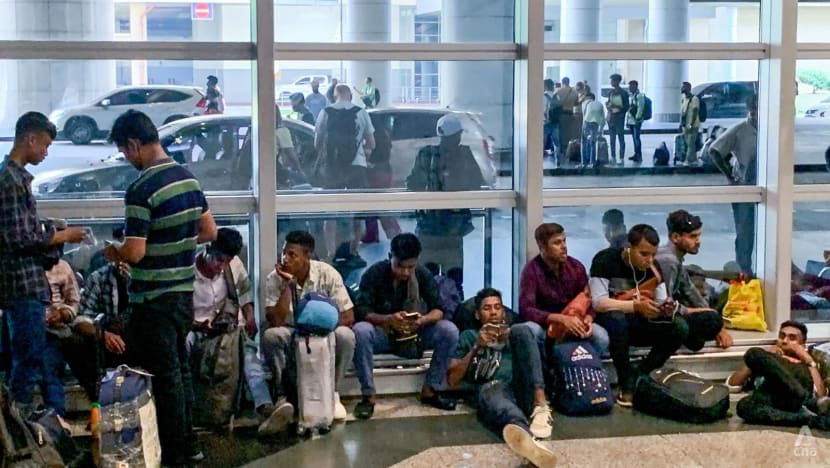
Workers from Bangladesh outside the arrivals and transport terminals at Kuala Lumpur International Airport (KLIA) Terminal 1 on May 31, 2024. (Photo: CNA/Fadza Ishak)

This audio is generated by an AI tool.
KUALA LUMPUR: There was relative calm at Malaysia's Kuala Lumpur International Airport (KLIA) on Friday (May 31) as efforts to process thousands of migrant workers who had rushed in to beat a government-imposed deadline appeared to pay off.
The country saw a surge in migrant arrivals this week as employers scrambled to bring in workers by Friday or have their unused foreign-labour quotas cancelled. The deadline, imposed by the Home Affairs Ministry, was unexpectedly brought forward two months ago from Sep 30.
Videos have circulated online in recent days showing scores of migrant workers milling around KLIA’s two terminals. About 2,500 of them have arrived each day since May 22 and up to 4,500 arrived on Monday, several times higher than the 500 to 1,000 arrivals usually seen, the immigration department said.
Officials said they were taking measures to remedy the “congestion”, and eyewitnesses said there were no big crowds at the airport on Friday.
In the morning, CNA saw several groups of migrant workers from Bangladesh waiting at KLIA main terminal’s transportation hub on the ground floor for buses to take them to their accommodation. They were accompanied by agents and company representatives.
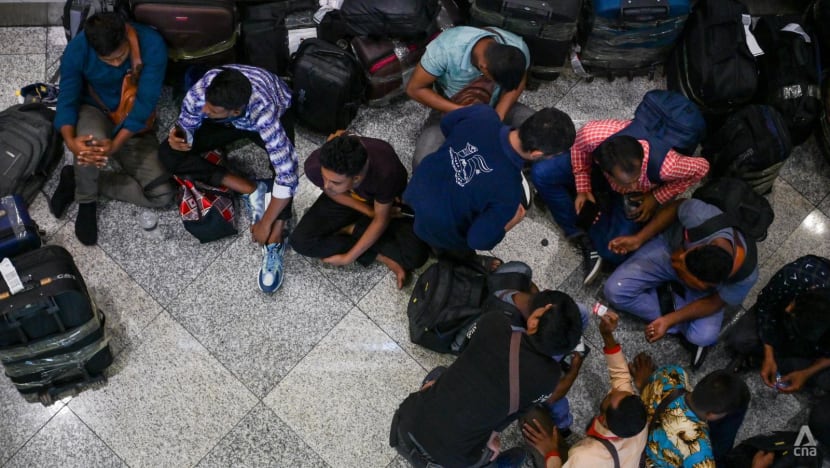
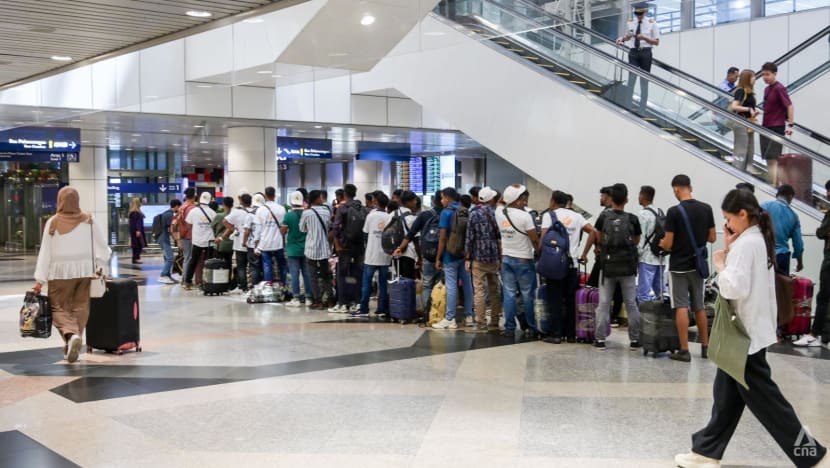
Foreign manpower agents who spoke to CNA said immigration officers worked overtime on Thursday to process the spike in migrant worker arrivals.
Mr John Gananathan said he was at the airport the past few days and witnessed how the sudden increase in migrant workers had caused a bottleneck in the gate area.
“There was a sudden surge of chartered flights that came in at one shot after a cyclone hit Bangladesh in the past few days, disrupting flights,” he said.
Cyclone Remal hit southern Bangladesh and parts of India on Sunday, unleashing heavy rains and tidal surges. At least 10 people died and 3.75 million people were affected, according to the Bangladesh government’s preliminary assessment.
“The problems (cyclone) occurred when there was already a deadline and companies were rushing to bring their workers in,” added Mr Gananathan.
The situation improved on Friday as the immigration department added more counters and officers, and flights from Bangladesh arrived on schedule, the agents said.
One agent who declined to be named said she was confident she could bring in all her workers before the deadline, provided there were “no more (flight) delays”.
“We were rushing a lot when the deadline was brought forward, but today everything seems okay,” she said.
A manpower agent who only wanted to be known as Mohd Fizi said employers were forced to fast-track employee arrivals to ensure their remaining quotas did not go to waste.
His company has brought in hundreds of workers this month, up from five to eight usually, he said. “It has been a really hectic time,” he said.
Some companies had applied for worker quotas months ago but delayed the arrival of the migrant workers until the last minute as they had no work for them.
“Companies had requested quotas but wanted to delay the entry of workers,” said Nana, a representative of a plastics manufacturer in Johor Bahru who was at KLIA to pick up 50 workers.
“If they had come here (earlier), they would have been jobless,” said Nana, who declined to give her full name.
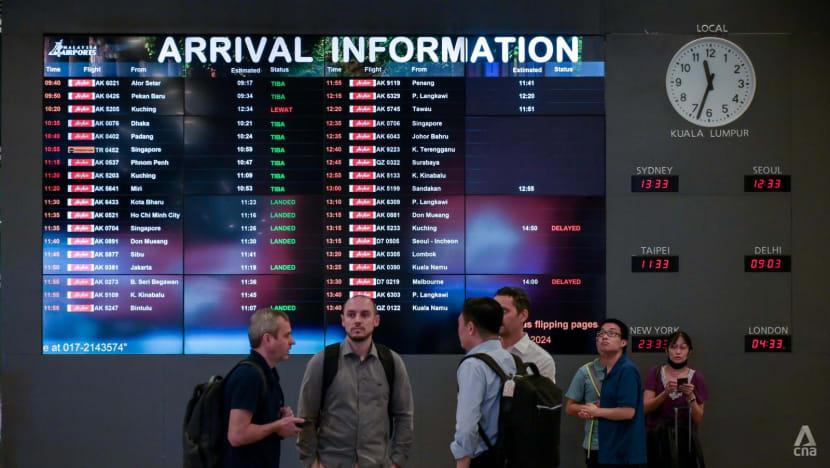
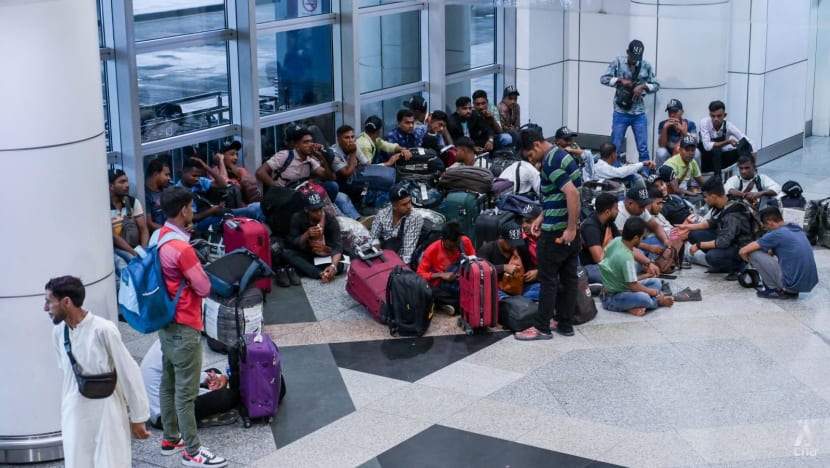
SOME WORKERS STILL IN HOME COUNTRIES, WITH FEES PAID UP
According to official statistics, documented migrant workers make up about 15 per cent of Malaysia’s workforce and many work in so-called 3D – dirty, dangerous and demeaning – jobs that are usually shunned by locals.
Combined with undocumented workers, their numbers could be around 5.5 million based on unofficial estimates.
Employers from six sectors are allowed to import labour from 15 countries – Indonesia, Bangladesh, Thailand, Cambodia, Nepal, Myanmar, Laos, Vietnam, Philippines, Pakistan, Sri Lanka, Turkmenistan, Uzbekistan, Kazakhstan and India.
Workers from Indonesia, Bangladesh, and Nepal make up 77 per cent of migrants in Malaysia.
The sectors allowed to hire foreign workers include manufacturing, plantation, agriculture, services, construction, as well as mining and quarrying.
Labour recruitment is a multi-billion-ringgit business beset with problems such as the extraction of hefty fees by labour brokers and other parties from jobseekers, who may end up in debt bondage.
Since last year, up to tens of thousands of migrants, mostly from Bangladesh and Nepal, have been left in limbo after arriving in Malaysia and finding that the jobs promised to them did not exist.
It is unclear how the situation will play out with the newest arrivals as well as those still waiting for their flights to Malaysia.
Related:
Bangladeshi worker Habib landed at KLIA at 5.30am on Friday, more than seven hours behind schedule after “immigration issues” at Dhaka airport delayed his flight.
The 28-year-old told CNA he was grateful to have made it to Malaysia before the deadline, saying the immigration process was “fast”.
“I couldn’t come earlier because the flights were full, even though I already paid to come here,” he said.
He previously worked in Malaysia for seven years but was forced to return to Bangladesh in 2020 after his contract ended and the COVID-19 pandemic hit.
Mr Habib acted as interpreter for a group of 15 countrymen – all wearing white caps – who had arrived with him. They were waiting for a bus to take them to Penang, where Mr Habib will work in the textile industry for RM1,500 (US$318.60) a month.
He has “many” friends in Bangladesh who have already obtained visas to work in Malaysia but have yet to fly over, he said.
“If they can’t come in, and they have already paid for it, will they get their money back?” he asked. “I feel lucky (about my situation), thank God.”
Bangladeshi news website Kaler Kontho reported on Friday that recruitment agencies in the country had urged the Malaysian government to extend the deadline for Bangladesh nationals who had already been approved to work in Malaysia.
The Bangladesh Association of International Recruiting Agencies (BAIRA) told the publication more than 30,000 workers from the country had obtained approval to work in Malaysia but were unable to make it by May 31.
“We have held several meetings with the (relevant Bangladeshi) ministry in this regard. We talked about extending the time by one or two months. Then all the workers could have been sent,” BAIRA was quoted as saying.
“Because if the workers can’t go, they will suffer financial losses.”
The association last year estimated that each worker pays up to RM20,000 to multiple players in the recruitment process.
Malaysian High Commissioner to Bangladesh Haznah Md Hashim said at a press briefing in Dhaka on Wednesday that the Malaysian government had set the May 31 deadline for national and border security reasons.
“It is an open secret that there are quite a number of illegal (migrants) in Malaysia. I am not referring only to Bangladesh but from all 15 source countries,” she said, adding that the government will deal with the matter “internally” after the deadline has passed.
When asked about recruitment syndicates, Mdm Haznah said the Malaysian government was trying its best to ensure that recruitment of foreign workers is done ethically and transparently.
“(But) there are things … beyond the control of the two governments (of Malaysia and Bangladesh),” she stated.


















